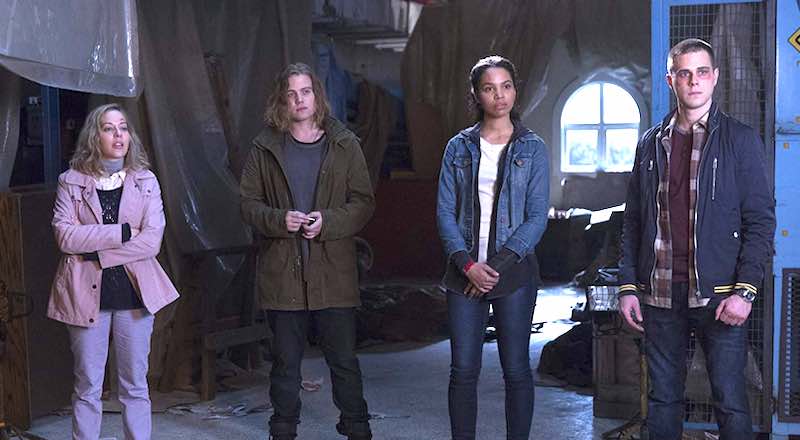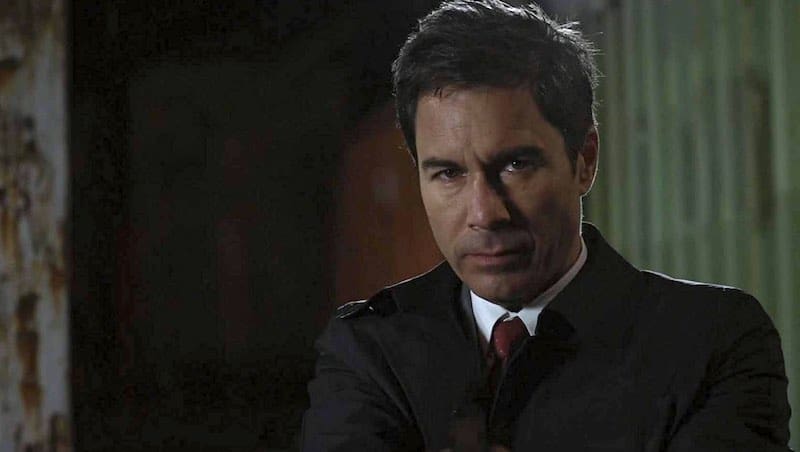Season 3 of Travelers continues the efforts of the team who came from the future in hopes of changing the path of history to improve the future of humanity and planet Earth.
If you enjoyed the first two seasons of Travelers, you can trust that you’ll like season 3. The series found a winning formula and keeps it going.

A terrific ensemble cast lead by Eric McCormack as FBI agent and traveler Grant MacLaren struggle to carry out their mission to save the world. Other key characters on the team of travelers from the future are Marcy (MacKenzie Porter). She’s a doctor. Carly (Nesta Cooper) is a crack shot and brilliant fighter. Trevor (Jared Abrahamson) is a very old soul in a young body. Phillip (Reilly Dolman) can see future and alternate timelines. Grace (Jennifer Spence) is a traveler and hangs around doing computer programming quite a lot of the time, but she isn’t part of the team.
Returning in season 3 is Marcy’s love interest David (Patrick Gilmore), Carly’s problematic husband Jeff (J. Alex Brinson), and Grant’s wife Kat (Leah Cairns). Dr. Perrow (Amanda Tapping) returns as a therapist, briefly. Amanda Tapping also directed in season 3. These characters are humans in their own time. Unless maybe they aren’t. Bodies can be taken over by “The Director” and a new traveler’s consciousness slipped into that host’s body. People change on a dime in this series.
The Director is a machine off in the future making decisions about what the travelers are told to do in order to change history and make things right with the world. The world has a lot of problems in the 21st Century. The most important is climate change. That’s the one that’s destroying the future. Talk about art imitating life.
Grant has new boss in the FBI. She’s Joanne Yates (Kimberley Sustad). Like most people who learn what the travelers are, she’s a skeptic at first. But she can be convinced under the right circumstances. Her job is to supervise Grant because the FBI knows he’s a traveler.
A chief source of conflict in season 3 comes from “the faction.” The faction is another group of travelers from a future time. They cause all sorts of mayhem.
The science aspect of the science fiction in this time travel drama isn’t front and center, but the show does use the idea of nanites. In the series, nanites carry information to the future in the blood of travelers called archivists. There’s an issue called temporal aphasia in one of the travelers. It seems based on fake science, as far as I can tell. The way the gigantic computer named Ilsa communicates with The Director somewhere in the future is not tied to any scientific theory either.
The relationships among the travelers and the people around them drives much of traveler’s behavior and choices. The people and their lives create more drama than any sci fi gadgetry. Caring is against the protocols the travelers are supposed to follow, but people are human no matter what, aren’t they?
The Director and the travelers make a mess of things. Nothing goes right. It looks pretty grim for saving the future, but our intrepid heroes never give up hope and never stop trying. I absolutely loved the last few moments of the final episode of the season. It’s beautiful and leaves the door open for a new season. And it made me smile.
Amanda Tapping and Eric McCormack both took another turn at directing in season 3. Travelers was created by Brad Wright. All three seasons are available on Netflix.

love the series,like you said, the excellent cast helps
MacKenzie Porter who plays Marcy is an accomplished musician. She just released a new album. That talent is not used at all in Travelers.
interesting, would rather listen to her play than to David saying anything
Ha! She lives in Nashville. Sings country.
I have enjoyed the twists. I admit both season 2 & 3 took me for surprise as to the direction. I think the entire cast works quite well as an ensemble.
Having stated that, I have to admit there were many moments in all the seasons I was dumbfounded how clueless, naive & gullible ALL of them were in respect to strangers, safeguarding any of their residences, preparing against wiretapping and other surveillance devices, somehow have trackers to mark a traveler to protect against 001.
Biggest gripe? End of season 2 was a thriller. Beginning of Season 3 wrapped up that ending in a swift ‘boring’ way. Dr. Parrow was used in a small manner. What happened to 001s original body? It was implied they switched consciousness not that he took over. Later on the science can go one way, in person it can be switched I thought.
Exception of 001, all the ambiguous bad guys that contributed to the last part of season 2 are suddenly jettisoned with nary a care or explanation.
There was not one question at all about the historical status of Illea whether she’s good/bad or used for either. Nobody ever questioned how the FBI was able to target the ‘cells’ to kill them. The software application was supposedly advanced in years for them to be able to decipher & detect the new travelers, so how did they know here and in foreign countries about them?
Biggest pet peeve? Lack of communication. Dave is brought into the loop & swept up ending in the archive. Unbelievably not once does he mention Jeff approached him & how they were attacked. Not once does he mention Jeff during the entire time in the archive and later on at the safe house.
There were more interactions with other traveler cells but not that many in the entire season.The one FBI agent taken over in season 2 simply disappeared for the remainder of season 3 after the one episode. Wouldn’t he have been helpful?
They know how to find 001 with EEGs and other similar devices yet not one person on the team thinks about how they can utilize this as a ‘test’ on any travelers they come across even themselves? The serial killer should have been documented in case files as ‘person of interest’ yet nothing was listed as a suspect in the murders?
Why didn’t anyone recognize that the director was cutting more & more back? The chicken & the egg which comes first, makes me wonder if Illsa was the precursor that the director was built upon. Why didn’t Grant stop or change methodology of the computer scientist who made it?
I’m fascinated by one of your ideas, that Ilsa was the precursor to The Director. Wouldn’t it be interesting if that were true? Who knows where our technology today will lead in the future, after all?
It was mentioned briefly that 001’s original host body was in a psychiatric prison, I believe.